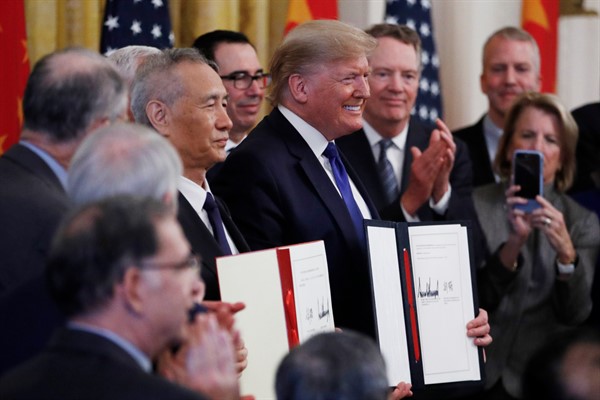One of the great traditions in U.S. trade policy circles is the semiannual gathering of former U.S. trade representatives. Started two decades ago by Sherman Katz at the Center for Strategic and International Studies and carried on by William Reinsch, who holds the Scholl Chair in International Business at CSIS, the meetings bring together many of the former top U.S. trade officials to share insights on current economic issues. It is a unique event that pools the accumulated wisdom of several decades; there are no similar gatherings of former U.S. secretaries of state or defense. This year’s version—held online, of course—featured no fewer than eight former U.S. trade representatives, from President Barack Obama’s second trade representative, Michael Froman, all the way back to William Brock, who was President Ronald Reagan’s first trade envoy in the early 1980s.
Amid the usual discussions on the coming challenges for Joe Biden’s presidency, one of the former trade representatives dropped a small bombshell: Has “most-favored nation,” the central idea underlying the expansion of global trade over the past 75 years, outlived its utility? “What is the purpose of MFN any longer?” asked Charlene Barshefsky, one of President Bill Clinton’s trade representatives, who negotiated China’s admission to the WTO in 2001 and persuaded Congress to grant “most-favored nation” status to China. Countries around the world, she noted, had now entered into more than 300 bilateral and regional deals outside of the WTO, including the recently concluded 15-nation Regional Comprehensive Economic Partnership, or RCEP, in Asia. “By definition these are not MFN,” she said. “They are either intended to be exclusionary, or they operate in an exclusionary manner.”
“Most-favored nation,” despite the odd phrasing, is not an academic notion. It is the core concept of the modern global trading system, enshrined in Article I of the General Agreement on Tariffs and Trade that predated the WTO. It states unequivocally that countries cannot discriminate among their trading partners. If the United States, for example, reduces tariffs on imports from any country, if must offer the same tariff reduction to imports from all other countries. The idea of unconditional “most-favored nation” status was the foundation of modern global trade liberalization after World War II; smaller countries were able to enjoy the benefits of trade because any deals negotiated among the major trading powers, like the U.S. and Europe, were automatically extended to others.

